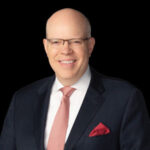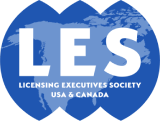Mentorship is one of the pillars of the LES community. Each year at the LES USA-Canada Annual Meeting, the Frank Barnes Award is presented to an LES member, who has dedicated considerable time and energy to mentoring fellow licensing professionals. The award was established in the year 2000 to commemorate Frank Barnes and his significant contributions to the field of licensing through mentorship. Mr. Barnes was Corporate Vice President for Abbott Laboratories and became known throughout the pharmaceutical industry as one of the ‘Deans of Pharma Licensing’. More about Mr. Barnes and the list of Frank Barnes Award recipients in this link.
In recognition of Mentorship Month (Feb. 2024) we have conducted interviews with some of the most recent Frank Barnes Award recipients. Each awardee was asked to share her or his mentorship experience with LES, and offer advice to mentors and mentees alike, making their first steps in forming the unique professional alliance that is known as mentorship. The interviews are inspiring and informative and appear below in chronological order (based on the year of receiving the award).
 2018 – Louise Levien (Executive Director & Board Member, LES USA-Canada)
2018 – Louise Levien (Executive Director & Board Member, LES USA-Canada)
Q: What benefits did you gain from being an LES mentor?
A: As a mentor, I always developed new perspectives from listening to my proteges, and those perspectives were invaluable to my own career development.
Q: What benefits did your mentee(s) gain from your mentorship?
A: I hope I was able to provide perspectives and contacts that helped them develop personally and professionally. Sometimes, a mentee needed to vent, and I could provide a non-judgmental ear. Other times, they needed a push to move to the next career level. Sometimes they needed to bounce a problem off another person and work through a solution. And sometimes while I couldn’t help, I could provide them with introductions to others who might.
Q: Please share a story with us about one of your mentorship experiences.
A: A woman I mentored was offered a transfer out of the country, but her husband’s job was in the US. She had two very young children and was trying to determine what to do. We had quite a few talks during the month while she was deciding. Her starting position was to turn down the great opportunity. Then she thought that maybe she would go and leave the children with her husband. Eventually, she brought the younger child with her, and the older one stayed with her husband until he could work out a position with his company that he could do remotely (pre-COVID). The family was reunited within about 6 months. After that highly successful assignment, she went on to become a manager and have a very successful career.
Another story: I was mentoring a woman who was an extremely talented scientist. She had been with the company for about 10 years, and I asked if she had any interest in going into management. She said “yes”. I asked her if she had told her supervisor or put it into her annual review forms. She said “no”. I insisted she tell her management and she was promoted within a year and has had a very successful career in management as well.
One final story: I was really upset about an encounter I had with a VP, and I was so upset I was ready to storm into his office and read him the riot act for the inappropriate behavior (in my opinion). I called one of my former proteges and she convinced me to think about it over the weekend. By Monday I had cooled off and thought of a more appropriate response. So, the proteges become the mentors.
Q: If you were advising a professional who is just starting out, how should they approach a mentor, and how to ensure a good fit?
A: I would suggest that they start slowly. Most people are very busy and can’t start taking weekly one-hour calls from a new protege. First, find out how the mentor likes to communicate. After an initial “get to know each other” meeting, the professional should start by asking some very actionable questions, like: Do you know anyone? Can you help me find…? Have you ever had this happen and can you give me ideas how to handle it? – Open ended questions like: I’d like to change careers, but not sure where to begin… are much more difficult for a mentor and take a lot more thought and time. Once the professional has an established relationship and the professional has demonstrated follow through on the actionable items, the harder questions become easier for the mentor to work on.
Q: Is there anything else you would like to share that is related to your mentoring experience with LES?
A: I think everyone should consider multiple mentors. More perspectives can be confusing but can also provide more opportunity to open horizons. And everyone can be a mentor. It requires listening and then trying to provide helpful perspective.
 2019 – Jeffrey S. Whittle (Partner, Womble Bond Dickinson; Past LES USA-Canada President)
2019 – Jeffrey S. Whittle (Partner, Womble Bond Dickinson; Past LES USA-Canada President)
Q: What benefits did you gain from being an LES mentor?
A: I receive intrinsic joy in helping and serving others–watching them grow in their careers. It is like the MasterCard commercial–“priceless”. I also enjoy seeing these individuals take leadership or otherwise serve our profession in numerous ways that benefit me and others.
Q: What benefits did your mentee(s) gain from your mentorship?
A: Education, networking, career/professional development, training, leadership development, and friendships.
Q: Please share a story with us about one of your mentorship experiences.
A: I will share a “collective” story about mentoring: I have enjoyed “teaming” with other often younger professionals to “co-teach” professional development or education courses for LES USA/Canada and for various other LESI country societies over the years (e.g., LES Mexico, LES Brazil, LES UK, LES Arab Countries, LES Australia, LES South Africa, and many others). It is so fun for me to see these professionals have trepidation at first, watch me and others in action, be teachable and coachable themselves (mentored by me and others), and then grow and find their legs to become outstanding instructors, speaker, and leaders in LES USA/Canada/LES Their Country/LESI. It makes me smile almost every time from the joy of knowing how they are contributing to our profession in so many ways (inside and outside of LES). I just want to congratulate them on their hard work, confidence, leadership, and accomplishments as it benefits all of us many times over–well done to each of them!
Q: If you were advising a professional who is just starting out, how should they approach a mentor, and how to ensure a good fit?
A: I would encourage them to be open and friendly about their desires to be mentored, try to let the mentor know they will work around the mentor’s schedule, and that it is important to them. I would encourage them to share how much time they hope to put in meetings, meals, coffees, or calls each time (e.g., 30 minutes, 1-1.5 hours, or the like), and I would encourage them to be complimentary, share that they want to be teachable/coachable, and share some of the things they hope to learn or accomplish through the process (e.g., only periodic advice, strategic career help, networking ideas, etc.).
Q: Is there anything else you would like to share that is related to your mentoring experience with LES?
A: It is a wonderful way to give back to our profession, and the relationships and friendships established through mentoring last a lifetime.
 2020 – Steven M. Ferguson (Deputy Director, Office of Technology Transfer, NIH; Sr. VP, LES Management Council)
2020 – Steven M. Ferguson (Deputy Director, Office of Technology Transfer, NIH; Sr. VP, LES Management Council)
Q: What benefits did you gain from being an LES mentor?
A: Making connections and helping future colleagues and contemporaries get off to a good start. One of the individuals I helped mentor over the years has ended as the Director of my office (i.e. my actual supervisor!).
Q: What benefits did your mentee(s) gain from your mentorship?
A: Clear evidence that tech transfer / licensing can be a great and exciting career for a scientist. A new personal resource and contact early in their career when they don’t have such in place yet.
Q: Please share a story with us about one of your mentorship experiences.
A: I typically offer to help give a webinar or workshop at mentee institutions. At an HBCU, the university president introduced our program. For a webinar in Bangladesh, I ended staying up until the wee hours to reach the program audience.
Q: If you were advising a professional who is just starting out, how should they approach a mentor, and how to ensure a good fit?
A: Schedule periodic meetings in advance; ask lots of questions; bring specific problems or topics for further discussion.
Q: Is there anything else you would like to share that is related to your mentoring experience with LES?
A: To my pleasant surprise, it was a mentee who actually nominated me for the Frank Barnes Award. You never exactly know how your mentoring efforts will turn out, but it always seems the ROI is simply huge!
 2022 – Gillian Fenton (Special Counsel, GSK; Past LES President)
2022 – Gillian Fenton (Special Counsel, GSK; Past LES President)
Q: What benefits did you gain from being an LES mentor?
A: I love to teach, to help develop others on their professional journeys.
What benefits did your mentee(s) gain from your mentorship?
A: Cross training, coaching and constructive feedback.
Q: If you were advising a professional who is just starting out, how should they approach a mentor, and how to ensure a good fit?
A: I would advise a new professional to look for someone who has experience in the types of projects / matters / licensing transactions that they are most interested in and ask that person how they developed their expertise. Also, of course, if the person is willing to be a mentor, or if they can suggest someone else who may be an even better fit. If possible, a face-to-face informal conversation is often the best and quickest way to explore whether someone is a good fit as a mentor.

